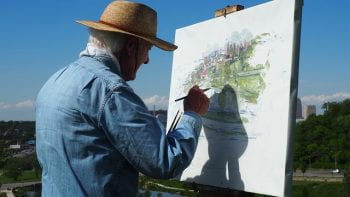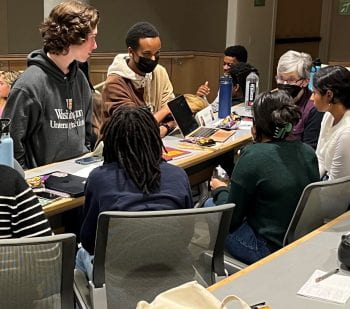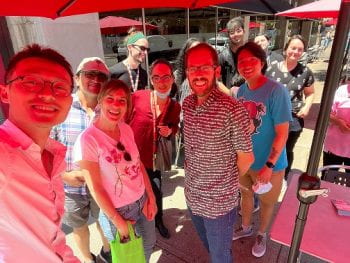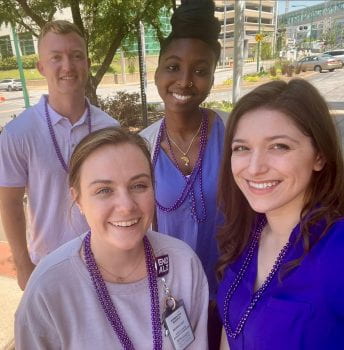One student reflects on her Summer Research Program – Aging & Neurological Diseases mentored project on preventing falls among older adults with Alzheimer’s disease.. uj
Researching Alzheimer’s Disease

Harvey A. Friedman Center for Aging Blog Posts

One student reflects on her Summer Research Program – Aging & Neurological Diseases mentored project on preventing falls among older adults with Alzheimer’s disease.. uj

A student in the Summer Research Program – Aging & Neurological Diseases Track reflects on her experience working with the PEP Lab and mentor, Susan Stark.

Students in the Summer Research Program engage in hands on research via a faculty mentor. One student in the Aging & Neurological Diseases Track reflects on her experience working in the Purpose Aging Transitions Health lab this summer.

Summer Research Program- Aging & Neurological Diseases Track participant Leah Noble discusses her experience with the Movement & Neurodegenerative Disease research lab.

2024 Summer Research Program – Aging and Neurological Diseases Track participant Oluwadamilola Adesina details his experience with the Social Health and Participation Laboratory.

A student in the Summer Research Program – Aging & Neurological Diseases Track reflects on her work in the Foster Lab.

A student in the Summer Research Program – Aging & Neurological Diseases Track gives an update on his mentored project centering on neurological health.

St. Louis serves up a new exhibit during PRIDE month. Learn more about it and the history of PRIDE in St. Louis.

Read the perspective of a student researching Alzheimer’s disease in the Summer Research Program Aging & Neurological Diseases Track.

What does it mean to be a researcher? Read a perspective from a student in the Summer Research Program Aging & Neurological Diseases Track.

Imagine a world where vaccines are tailored to your genetics and lifestyle. Read a perspective on precision health by a student in the Summer Research Program Aging and Neurological Diseases Track.

Learn about the work being accomplished by a student in the Summer Research Program – Aging & Neurological Diseases Track

Learn about summer studies in the Emotion and Relationships lab from a student in the Summer Research Program – Aging and Neurological Diseases Track.

Read a blog post in celebration of community partner, STL Village.

May is Older American’s Month! Find out more about tips for engaging in meaningful relationships and social connections, which have proven to improve our mental, physical and emotional well-being as we age.

Here’s what to know about climate change and aging…

The topic of aging and the presidential candidates is one that many are talking about. Read about one such discussion among older adults, led by the co-directors of the Friedman Center for Aging.
Learn about how you can become a volunteer for dementia research.

Learn more about a former students work to advance health equity among older LGBTQ adults.

Written by Michele Dinman, MPH, project coordinator at the WashU for Life Initiative, Harvey A. Friedman Center for Aging October 7 is Ageism Awareness Day. Led by the American Society on Aging, it is held to raise awareness of the existence and impact of ageism in our communities. The World Health Organization, in its Global […]

For those who think President Biden is “too old” to run for another term, consider this reflection from a few WashU gerontologists.

One of the co-founders of STL Village celebrates the STL chapter’s founder on her 100th birthday.

A student in the Summer Research Program – Aging & Neurological Diseases Track discusses her experiences with community-engaged research.

A student from the Summer Research Program – Aging & Neurological Diseases Track reflects on her project work and summer experience.

Read a perspective of her Summer Research Program – Aging & Neurological Diseases track experience from a member of the cohort along with her work on the “Spatial Navigation Experiences and Abilities” project.

Read a perspective on the Summer Research Program experience from a student in the Aging & Neurological Diseases track.

Read a perspective on racial equity in research and health care.

A student in the Summer Research Program – Aging & Neurological Diseases track reflects on her time working with the Emotion and Mental Health Lab.

Read a perspective on Alzheimer’s disease from a student in the Summer Research Program – Aging & Neurological Diseases track.

A student in the Summer Research Program – Aging & Neurological Diseases track reflects on her experience so far.

Read a perspective on research and “Imposter Syndrome” by a participant in the Institute for Public Health Summer Research Program – Aging & Neurological Diseases track.

A student in the Institute for Public Health Summer Research Program – Aging & Neurological Diseases track discusses the impact of Alzheimer’s disease.

Read one Summer Research Program student’s perspective on stroke interventions.

Learn a bit of history on how PRIDE month has become a time to celebrate LGBTQ+ communities & health equality.

Read a student’s perspective from the Institute for Public Health Summer Research Program, Aging & Neurological Diseases track.

Learn about the statistics and preventative measures surrounding suicide among older adults.

Read this blog post about how older adults are using technology to bolster their independence.

Written by Michele Dinman, MPH, project coordinator for the Harvey A. Friedman Center for Aging at the Institute for Public Health Happy Older Americans Month! For the past 60 years, the Administration for Community Living helps us celebrate and honor older Americans each May. This year’s theme, Aging Unbound, promotes the importance of enjoying independence […]

In this blog post, MSW student Marissa Scofield discusses how Cognitive Stimulation Therapy can provide a social outlet and improve quality of life for those living with dementia.

Read about how more older adults today are interested in working past retirement.

Learn more about suicide prevention among older adults in this blogpost by one of the students attending the course, Contemporary Perspectives on Aging.

Written by Renee Hays, MSW candidate, Brown School; student in Contemporary Perspectives on Aging The American prison population has been aging at a rapid pace throughout the twenty-first century. According to the National Institute of Corrections, between 1993 and 2013, the number of prisoners in America aged 55 and older sentenced to at least one […]

Read a perspective from a member of the Friedman Center for Aging staff, regarding how we often discriminate against ourselves as we age.

A participant in the “When I’m 64…” course at WashU talks about her experience.

Successful aging can be achieved through patient-focused care, according to this student in the Summer Research Program-Aging & Neurological Diseases Track.

Learn more about how one study is helping reduce symptoms of anxiety or depression that older adult patients may face before/after surgery.

Read reflections on her program experience from a student in the Summer Research Program-Aging & Neurological Diseases Track.

Learn about the Karch Lab and this Summer Research Program student’s research experiences while participating in the Aging & Neurological Diseases Track.

Learn more about the DRIVES Project in this blog post by a student in the Summer Research Program – Aging & Neurological Diseases Track.

Learn more about stroke neurology and other physician perspectives on neurological diseases in this blog post by a student in the Summer Research Program – Aging & Neurological Diseases Track.